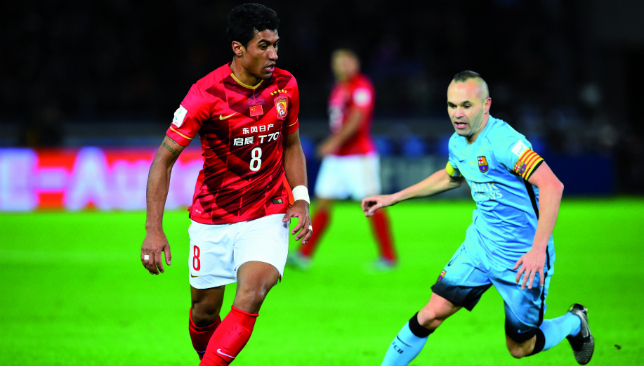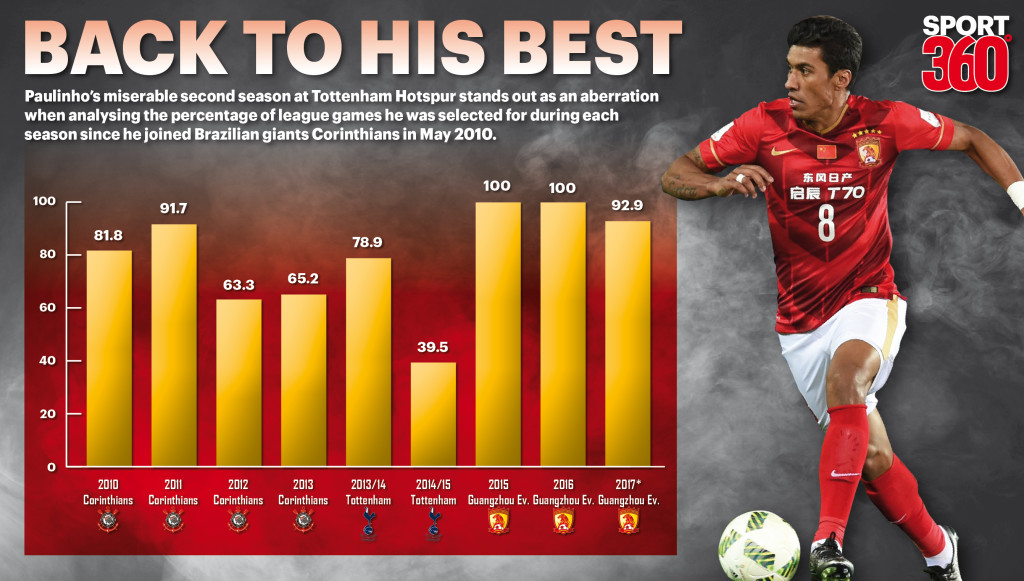
A pillar of Brazil’s national team gaining interest from European giants Barcelona would ordinarily have just one outcome.
Yet, while the likes of Neymar, Ronaldinho, Rivaldo, Ronaldo and Romario all found the Camp Nou’s allure irresistible, a distinctly different tale is emerging this summer with compatriot Paulinho.
Rather than rushing to the airport, the 28-year-old – who is the fulcrum of Tite’s revitalised Canarinho – has, historically, chosen restraint. And what makes this stance seismic is that the reticence originates from a centre midfielder plying his trade in China for Guangzhou Evergrande, far away from professional football’s heartland during its first century of existence.
“[Barcelona] contacted my agent,” Paulinho told Globo Esporte last month. “There is an offer, but in life, and also in my career, I find myself at a very happy stage now.
“When you are at such a stage, it’s difficult to make a decision.
“I need to weigh many things and then make up my mind.
“One of the critical factors is my happiness. I think firstly my wife and I are very happy in China, we like it here and we like the people.”
The massive injection of cash into the Chinese Super League which rescued the 41-times-capped international from his malaise at Premier League Tottenham Hotspur in June 2015 has upset the sport’s immemorial Euro-centric equilibrium. A time-honoured supply chain from the traditional developing nations of South America and Africa has been disrupted, potentially forever.
Whatever happens next with Paulinho – who has a €40 million (Dh167.8m) release clause contained within a renewed contract, which expires in December 2020 – has distinct ramifications.
A player can demonstratively now be churned out by Europe and then rehabilitated to the highest standard in China. Or, tumultuously, the living and playing conditions in the Far East have rapidly risen to a level where reasoned rejection follows when the old continent come calling.
“It [the Paulinho transfer] would be significant, principally because it would be proof that a move to the Chinese Super League is not fatally damaging to a player’s career,” says Michael Church, a journalist with more than 20 years’ experience covering Asian football for ESPN, Reuters and the Asian Football Confederation.
“Paulinho has used his time in China to rebuild his confidence after a less-than-impressive time in England. But what could be more significant is if Paulinho turns down a move to a club of Barcelona’s stature to stay in China.
“While some would no doubt paint it as a lack of ambition on his part, it would send a message that players are happy to stay in China, turn down one of the biggest clubs in the game and continue to play in the CSL because their ambitions – particularly when it comes to holding down places in national teams ahead of next year’s World Cup – can be satisfied.”
Paulinho is not alone as a prominent current international in the CSL. He regularly lines-up for Brazil alongside Beijing Guoan’s Renato Augusto, while battler Axel Witsel remains pivotal to Belgium despite a lucrative January switch to promoted Tianjin Quanjian.
In total, 20 of the division’s foreign contingent were selected in their nation’s most-recent squads.
Paulinho’s path has taken him from Lithuania’s FC Vilnius and Poland’s LKS Lodz a decade ago, to winning the Club World Cup for hometown side Corinthians in 2012.
He was a coveted star for club and country by the time Tottenham secured his signature three years later, with a succession of injuries and a dramatic loss of form then seeing him saved by his former national coach Luiz Felipe Scolari at Guangzhou.
The experience of having to battle back into the Selecao Brasileira after being ignored for more than two years after World Cup 2014 humiliation on home soil means he can afford to be circumspect, according to South China Morning Post journalist Andrew Mullen.
He says: “This is a big decision for Paulinho. He is a different, more confident player than the one that was at Tottenham, but with the World Cup looming, he must consider whether a starting place in the Chinese Super League is the same as a spot on the bench in Spain.
“That is not to take away anything from him as a player, but he would be a squad player at best for Barcelona.”
Regret was the overriding sensation for Spurs fans as they watched Paulinho exit White Hart Lane with so much potential unfulfilled. In contrast, Guangzhou have witnessed the powerhouse everyone expected.
With the dominant Southern China Tigers, he has missed just one game as they claimed the 2015 and 2016 CSL titles, plus lead the way in this year’s edition. Al Ahli were defeated in a tight 2015 AFC Champions League final and the 2016 Chinese FA Cup has also been won.

On the up: Paulinho has become a regular starter again at Guangzhou.
A partnership with China’s ex-Celtic and Charlton Athletic centre midfielder Zheng Zhi has been pivotal to the team’s success – and Paulinho’s recovery.
“Paulinho has unquestionably been the best player in the Chinese Super League, and I think the best player in Asia so far this year,” says Church. “He’s been scoring goals and setting them up, but he’s also become the heartbeat of the Guangzhou team.
“He was fantastic in the early season win over Beijing Guoan, when he scored twice – including the winner three minutes from time.”
His enlivening experience in China cannot be solely attributed for Paulinho’s transformation from Spurs reject to Barca target. The ascension of his Corinthians mentor Tite to the national team last June has brought him back to worldwide acclaim, headlined by March’s hat-trick against Uruguay.
Paulinho has missed just two of the 56-year-old’s 11 matches. It is the trust shown in him by Tite and Scolari over several years which has been key, according to Rupert Fryer – the editor of Brasil Global Tour.
He says: “He owed his career to Tite, really, and Scolari took him to the next level when he installed him in the same role in his Brazil team [from 2012].
“When he took the Brazil job, Tite had just three days to work with his new players ahead of a tricky international debut in Quito [against Ecuador]. Tite needed someone he could rely on. Paulinho has become something of an unexpected poster boy for the new Brazil.
“It’s worth noting that only once has Tite had the opportunity to field an experimental side, last month against Australia. There were eight/nine changes to that side from the one that played
Argentina a few days earlier – Paulinho remained.”
Both Paulinho and Barca have decisions to make about how to proceed. Yet, controversial and pervasive attempts by the Chinese Football Association to calm the transfer market could stop the move in its tracks.
Of these measures, Scolari declared to Mundo Deportivo last week that the new ‘tax’ – in which indebted CSL clubs must pay an equivalent amount to the transfer fee into a development fund – has ensured “Paulinho will not leave Guangzhou” as they can no longer afford a requisite replacement.
For the founding editor of respected and comprehensive website Wild East Football, Cameron Wilson, such diktats will have a negative impact.
He says: “Before this season, Chinese football was in general, doing very well. But the new rules have thrown the game here into a state of disarray and many clubs are unhappy about some of the changes which have been made.
“Just look at the transfer window – there have been no significant moves so far despite it being open for more than 10 days now.”